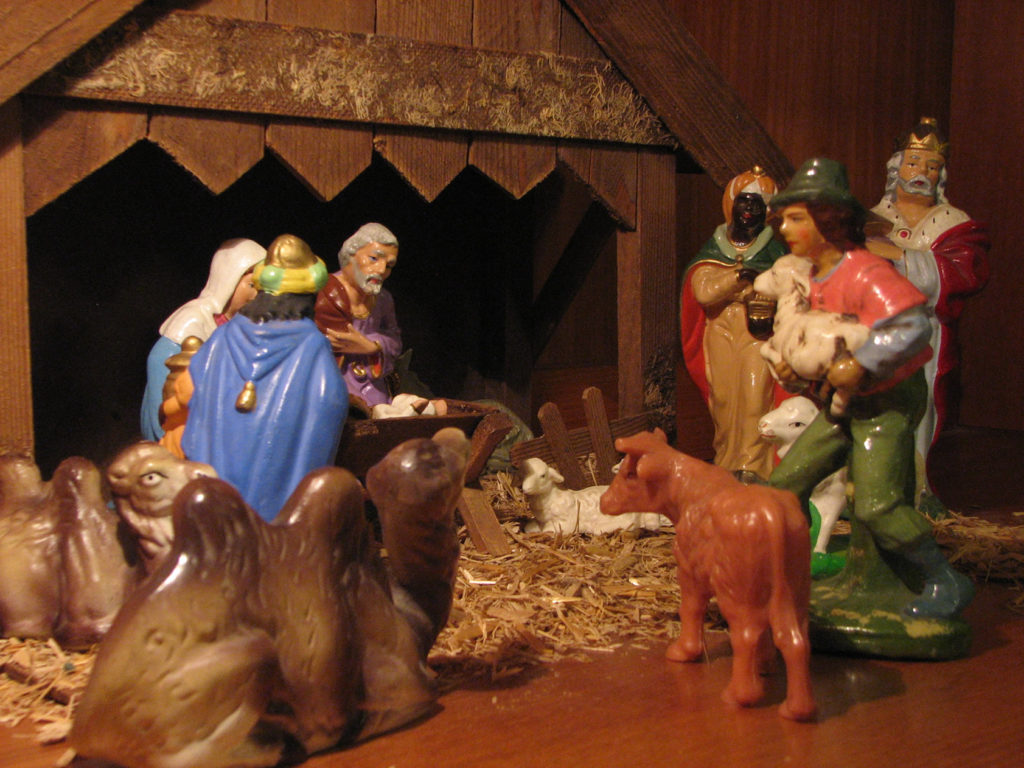Merry Mythmas
 I sat in the pediatrician’s waiting room with a sick child browsing a dog-eared parenting magazine. It was a glossy holiday issue full of colorful pictures of luscious goodies, glittering decorations, and happy families.
I sat in the pediatrician’s waiting room with a sick child browsing a dog-eared parenting magazine. It was a glossy holiday issue full of colorful pictures of luscious goodies, glittering decorations, and happy families.
The magazine contained an article by an expert in things child-related who wrote the typical-for-that-venue column about the holidays (carefully avoid the word “Christmas”). She noted how, for too many children, the reality has little resemblance to the window dressing. Financial constraints can put a severe cramp on gifting, causing a child to feel let down. Broken families can create turmoil, leading to feelings of abandonment or rootlessness. Health issues can put a damper on the joy of the season. The pin of reality can burst inflated expectations and leave the head ringing with depression.
I don’t recall much about the article, but the gist of one statement sticks in my mind. Concerning the importance of maintaining family traditions, she said that, whether we teach our children about Santa, “or the nativity, or any of the usual holiday myths,” we should give the child something stable to hold onto.
Parenthetical note: Looking for images to illustrate this post, I used the keyword “myth” to search the Morguefile site. The photo at the beginning of this post was one of the results.
I once had a discussion with a co-worker about this nativity myth. “I don’t understand why we’re supposed to believe in something as ridiculous as the virgin birth,” she said. “Childbirth is such a beautiful miracle anyway, what’s the point of making up something so impossible?”
For one thing, though childbirth is a wondrous event to be sure, there’s nothing miraculous about it. But this was no ordinary childbirth. The Holy Spirit implanting himself in a young girl’s womb to grow into a full-term baby? That’s a miracle. A wholly unique situation. “Unique,” however, is not synonymous with “impossible.”
There’s also the matter of fulfilled prophecy. Historians of every religious and non-religious ilk agree that the prophecies in question were made long before Jesus was born, so it’s not an issue of after-the-fact revisionism.
Moreover, Mary and Joseph couldn’t have contrived to fulfill every aspect of what was foretold even if it had occurred to them to do so. (“I know it looks like I cheated on you, Joe, but I’m still a virgin. Really. Just like Isaiah said. And to be sure everyone thinks that’s what this is, let’s go to Bethlehem to have the baby. The question is how can we get Herod to kill all the little boys in town afterward? I suppose we’ll have to hide out in Egypt for a while, but we’ll come back here to Nazareth eventually.” “Sure, I’ll cover for you, Mary. Why shouldn’t I? But do you think we can time the birth to coincide with that new star that’s supposed to appear in the sky?”) 
No matter what the evidence, not everyone’s going to believe Mary’s story. They scoffed at her then, and murky shame followed her the rest of her life. Nowadays, much of the world either puts virgin birth in quotes, suggesting it never happened, or capitalizes it, adding fantastic details to the story and elevating Mary to godlike status. Making the whole thing a myth, in other words. ‘Cause, you know, we all love a good myth.
It’s a shame that one of the most pivotal events in human history has been bedecked with enough embellishment to break a camel’s back. The simple, breathtaking truth becomes the fairytale while the fictional version is the real Christmas, as far as most of the world is concerned.
Yeah, I know, you’ve heard all this before, year after year, forever and ever and ever, amen. I’ll spare you the re-runs today.
However, though the subject is old and gray, it’s still relevant. If we could make Christmas go away by wishing it—or at least, change it into something more to our liking—Santa would have been grounded ages ago. But we can’t, and the question remains: what’s a Christ-follower supposed to do with Christmas?
Here’s a thought: why not celebrate it?
 Traditional festivities involve eating and drinking, of course, which should always be done with some sense of moderation. But we can revel with wild abandon in the Christmas spirit of selflessness and generosity, kindness, forgiveness, and hospitality. How about strewing peace and goodwill all over the place like confetti? Adorning our conversations with encouragement and cheer? Making someone else’s holiday enjoyable instead of moping about how someone has ruined ours?
Traditional festivities involve eating and drinking, of course, which should always be done with some sense of moderation. But we can revel with wild abandon in the Christmas spirit of selflessness and generosity, kindness, forgiveness, and hospitality. How about strewing peace and goodwill all over the place like confetti? Adorning our conversations with encouragement and cheer? Making someone else’s holiday enjoyable instead of moping about how someone has ruined ours?
I kinda think the Birthday Boy might like that.
So what if Jesus wasn’t born on December 25? He was born, wasn’t he? What’s more, he’s still alive. Would anyone believe that from listening to you talk?
We grinchy Christians have more to celebrate than anyone else. So let’s get off our high horses—and off your computer, you nerd! What are you doing staring at a screen on Christmas?—and act like God coming to dwell among us is a good thing.
Unrelated postscript: Though it’s the season to be jolly, it’s also time to bid you all adieu. It’s been a challenge and a pleasure to contribute every second Wednesday to the Speculative Faith blog over the past 14 months or so, but the time has come for me to invest my time in other endeavors.
every second Wednesday to the Speculative Faith blog over the past 14 months or so, but the time has come for me to invest my time in other endeavors.
I may pop in for a visit here and there, but for now, hear me exclaim as I drive out of sight,
Merry Christmas to all, and to all a good night.











































Wonderful post, Yvonne. So sad that the world sees this glorious event as myth. I loved your comments on how Mary and Joseph would have pulled off fulfilling even a handful of prophecies.
My kids are twenty and still in bed, as people that age like to be after playing video games long into the night. We don’t have another generation started yet, so I’m on the computer being a nerd before the guests arrive looking to be fed. I’m glad I’m here. Glad I got here in time to see you lay your finger aside your nose as up the chimney you rose. Hope you have a new year full of blessings.
I’m 22 and I spent the entire night staring at the screen, but I wasn’t playing videogames. I was installing Linux on my old laptop, trying to set it up as a productive secondhand writing and email computer for my mother. I tried installing three different Linux distributions before deciding on Xubuntu 13.10. Then I was unsuccessfully trying to get the driver for the laptop’s internal wifi adapter to work.
So, I think I out-nerd you all.
Is Xubuntu a relation to Ubuntu? I tried using Ubuntu on a partition of my old second-hand dinosaur desktop before it kicked the bucket, but I’ll admit that I didn’t give it a decent trial because I was/am still used to Windows, and Windows does what I want it to. Though because Microsoft is all soulless-corporation-ish, it’s still possible that I could convert, though I’m not really tech-savvy enough to navigate anything but the prepackaged, dummy-user-friendly stuff.
But I’m not going to challenge your nerd award. I went to sleep pretty early last night, even though I spent a good portion of the evening debating if I should get myself a yukata kimono or if I’m still too poor/cheap. (It’s like a bathrobe you can legitimately wear in public!)
/nerd (or is mine more geek?) tangent
Xubuntu is Ubuntu with a different desktop environments. The desktop environment is the greatest aesthetic element in a Linux distribution, so two distributions based on the same core with different desktop environments can feel as different from each other as Windows 8 is from Windows 7. I strongly dislike Ubuntu’s default desktop, although I considered it for my mother. I’m currently running Linux Mint 15 Cinnamon on my desktop PC. (“Cinnamon” is the name of the desktop environment — Linux Mint is also available with three other desktop environments.) I’m really fond of my Mint system, though I may sample a different Linux variety soon if I don’t decide to upgrade to Mint 16 instead.
I don’t really know how to classify this stuff. I’ve never been more than a nominal wannabe geek, and I have no idea if I qualify as a nerd. But I would never have imagined wearing a bathrobe in public, legitimately or illegitimately.
I had no idea that Linux was marketed like candy. Choosing would be hard for me, because my criteria is pretty much what looks/functions like Windows so I’m not floundering like I do with Macs.
And who wouldn’t want to wear a bathrobe all the time? But one minor thing the Drunk Girl Incident taught me was that it makes me feel weird to look somewhat homeless when I’m trying to appear to be a rational adult. A yukata would make me seem eccentric but respectable even if I were too lazy to get dressed in anything more complicated than a bathrobe.
Many of the Linux distributions have a traditional desktop layout that looks and functions basic like Windows, at least pre-Windows 8 Windows. I would include all four version of Linux Mint in this category. But if you ever need an operating system and you want Windows but don’t want to buy it, there is Zorin OS.
I can’t judge you for the bathrobe thing, because I’ve always dreamed about walking down the street wearing my longsword strapped over my shoulder, ideally over a large hooded green cloak.
Now that I’ve had plenty of caffeine and cookies, I’ll try a reply to the post itself.
I think the word “Mythmas” is perfect — the Mass of the True Myth. I don’t think we should allow the lingering influence of secular rationalism define the word “myth” as something that is obviously untrue.
Cynicism of celebrating myth taken.
It’s interesting that those who mock the “virgin birth” are reacting cynically to those who glorify the Virgin Birth. As you imply, I think both groups are mythologizing in different ways. Maybe mythologizing is inevitable. We’re always making value judgments about the narrative and emphasizing the significance of the story but inside and outside of its literal context.
Goodbye, then.
Thank you, Sally – I’m glad you stopped by. Thank you, Notleia and Bainespal, for some entertaining and educational comments. Now if I see a man on the street in a bathrobe, I can say with confidence, “Nice yukata!”